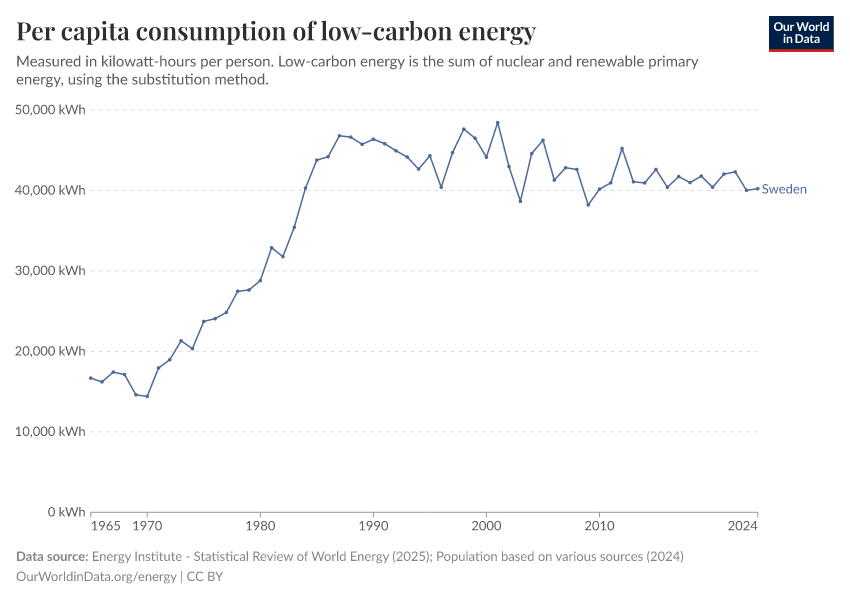Low-carbon energy consumption per capita

What you should know about this indicator
Primary energy is measured using the "substitution method" (also called "input-equivalent" primary energy). This method is used for non-fossil sources of electricity (namely renewables and nuclear), and measures the amount of fossil fuels that would be required by thermal power stations to generate the same amount of non-fossil electricity. For example, if a country's nuclear power generated 100 TWh of electricity, and assuming that the efficiency of a standard thermal power plant is 38%, the input-equivalent primary energy for this country would be 100 TWh / 0.38 = 263 TWh = 0.95 EJ. This input-equivalent primary energy takes account of the inefficiencies in energy production from fossil fuels and provides a better approximation of each source's share of energy consumption. You can find more details in the Statistical Review of World Energy's methodology document.
What you should know about this indicator
Primary energy is measured using the "substitution method" (also called "input-equivalent" primary energy). This method is used for non-fossil sources of electricity (namely renewables and nuclear), and measures the amount of fossil fuels that would be required by thermal power stations to generate the same amount of non-fossil electricity. For example, if a country's nuclear power generated 100 TWh of electricity, and assuming that the efficiency of a standard thermal power plant is 38%, the input-equivalent primary energy for this country would be 100 TWh / 0.38 = 263 TWh = 0.95 EJ. This input-equivalent primary energy takes account of the inefficiencies in energy production from fossil fuels and provides a better approximation of each source's share of energy consumption. You can find more details in the Statistical Review of World Energy's methodology document.
Sources and processing
This data is based on the following sources
How we process data at Our World in Data
All data and visualizations on Our World in Data rely on data sourced from one or several original data providers. Preparing this original data involves several processing steps. Depending on the data, this can include standardizing country names and world region definitions, converting units, calculating derived indicators such as per capita measures, as well as adding or adapting metadata such as the name or the description given to an indicator.
At the link below you can find a detailed description of the structure of our data pipeline, including links to all the code used to prepare data across Our World in Data.
Notes on our processing step for this indicator
Per capita figures are calculated by dividing by a population dataset that is built and maintained by Our World in Data, based on different sources.
Reuse this work
- All data produced by third-party providers and made available by Our World in Data are subject to the license terms from the original providers. Our work would not be possible without the data providers we rely on, so we ask you to always cite them appropriately (see below). This is crucial to allow data providers to continue doing their work, enhancing, maintaining and updating valuable data.
- All data, visualizations, and code produced by Our World in Data are completely open access under the Creative Commons BY license. You have the permission to use, distribute, and reproduce these in any medium, provided the source and authors are credited.
Citations
How to cite this page
To cite this page overall, including any descriptions, FAQs or explanations of the data authored by Our World in Data, please use the following citation:
“Data Page: Low-carbon energy consumption per capita”, part of the following publication: Hannah Ritchie, Pablo Rosado, and Max Roser (2023) - “Energy”. Data adapted from Energy Institute, Various sources. Retrieved from https://archive.ourworldindata.org/20250925-233948/grapher/per-capita-low-carbon-energy.html [online resource] (archived on September 25, 2025).How to cite this data
In-line citationIf you have limited space (e.g. in data visualizations), you can use this abbreviated in-line citation:
Energy Institute - Statistical Review of World Energy (2025); Population based on various sources (2024) – with major processing by Our World in DataFull citation
Energy Institute - Statistical Review of World Energy (2025); Population based on various sources (2024) – with major processing by Our World in Data. “Low-carbon energy consumption per capita – Using the substitution method” [dataset]. Energy Institute, “Statistical Review of World Energy”; Various sources, “Population” [original data]. Retrieved January 11, 2026 from https://archive.ourworldindata.org/20250925-233948/grapher/per-capita-low-carbon-energy.html (archived on September 25, 2025).